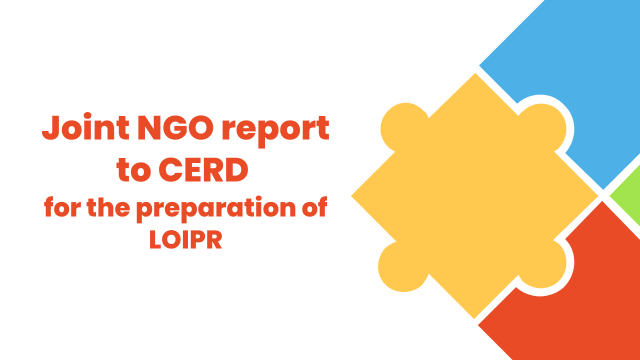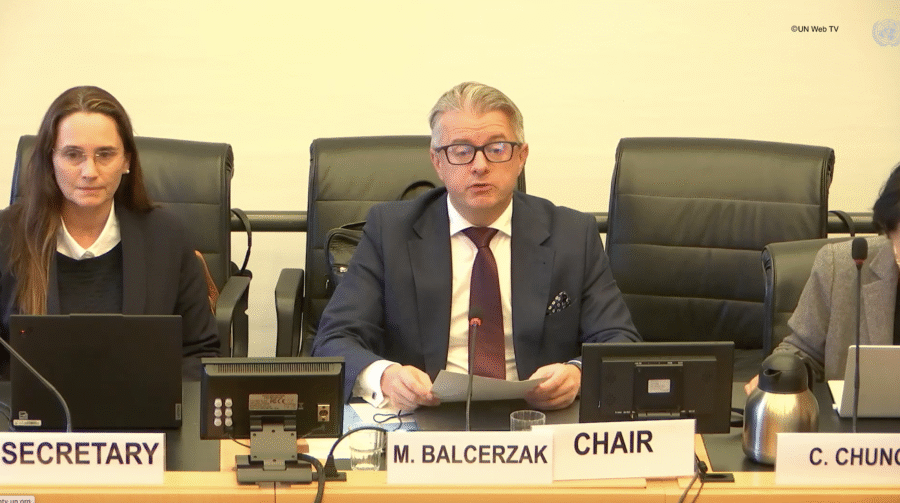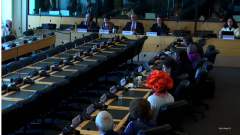Statement: 102nd session of the Committee on the Elimination of Racial Discrimination
November 16, 2020
Statement: 102nd session of the Committee on the Elimination of Racial Discrimination
16 November 2020
Thank you, Madam Chair,
We thank the Committee for inviting civil society organisations to address you today. We welcome the Committee’s continuing commitment to cooperate with civil society even under the current restrictions.
We welcome the Committee’s efforts to meet and undertake the work online in the midst of the significant challenges posed by the COVID-19 pandemic and the UN financial crisis. Yet, we are increasingly concerned by the growing backlog of State reports and protection gap due to the absence of State reviews.
In this regard, we wish to draw your attention to the joint civil society letter sent on 2nd October to all treaty bodies and the Office of the High Commissioner for Human Rights (OHCHR). The letter was jointly prepared by TB-Net (NGO Network on UN Treaty Bodies) and other two NGOs, and signed by 522 civil society organisations from all regions of the world to call for the resumption of State reviews in 2021 either in-person, online or in a hybrid manner. As one of the founding members of TB-Net, IMADR shared the letter with civil society organisations from/ working on the countries whose reviews before this Committee have been postponed, and almost all of them added their names to join the call. We are encouraged by the recent decisions of the Human Rights Committee and the Committee on Economic, Social and Cultural Rights (CESCR) to review at least two States each in their first sessions in 2021 either in person or online.[1]
We fully recognise various obstacles faced by the Committee in working online. Yet, it has been more than eight months since the World Health Organization (WHO) declared a pandemic of COVID-19, during which we have learned many lessons. There is also a good precedent of the successful online dialogue between the Committee on Enforced Disappearances (CED) and Iraq which was held last month.[2] The OHCHR and the UN Office at Geneva (UNOG) should apply these lessons to ensure that resources and conditions for the Committee to hold online or hybrid reviews are made available for the next year including a safe, feasible and accessible videoconference platform.
The letter clearly emphasises that online State reviews should be a temporary and exceptional measure in the context of the pandemic. In this regard, it is reassuring that the outcome report of the 2020 treaty body review reaffirmed the importance of in-person interactions.[3]
As part of TB-Net, IMADR actively engaged with the review of the treaty body strengthening process, and we welcome the outcome report which contains key findings and pragmatic recommendations. We particularly welcome the broad support from States and other stakeholders for predictable reporting calendars. We are convinced that fixed calendars for State reviews would increase predictability, transparency and accessibility for civil society. In particular, such a calendar can provide equal opportunities for indigenous peoples, minorities, migrants and others belonging to racialised communities to engage with the Committee regardless of which country they are from. We encourage the Committee to constructively engage with the OHCHR to prepare a proposed schedule for predictable review cycles, as recommended by the co-facilitators.
We are encouraged by the Committee’s statement on the pandemic in August which reaffirmed its monitoring role on the State compliance with the International Convention on the Elimination of All Forms of Racial Discrimination (ICERD) via the reporting and Early Warning and Urgent Action procedures, requesting information from States parties and civil society on racial discrimination in the context of the pandemic.[4] We stand ready to support the Committee and its Secretariat to fully resume its monitoring work in 2021.
We wish the Committee a successful session.
Thank you.
[1] Human Rights Committee, 131st session, https://tbinternet.ohchr.org/_layouts/15/treatybodyexternal/SessionDetails1.aspx?SessionID=2463&Lang=en
OHCHR (16 October 2020), Committee on Economic, Social and Cultural Rights concludes virtual sixty-eighth session, https://www.ohchr.org/EN/NewsEvents/Pages/DisplayNews.aspx?NewsID=26392&LangID=E
[2]http://webtv.un.org/meetings-events/human-rights-treaty-bodies/committee-on-enforced-disappearances/watch/consideration-of-iraq-333rd-meeting-19th-session-committee-on-enforced-disappearances/6197584834001
[3] Report of the co-facilitators on the process of the consideration of the state of the UN human rights treaty body system (14 September, 2020), paragraph 16, available at: https://www.ohchr.org/Documents/HRBodies/TB/HRTD/HRTB_Summary_Report.pdf
[4] https://tbinternet.ohchr.org/Treaties/CERD/Shared%20Documents/1_Global/INT_CERD_SWA_9234_E.pdf





